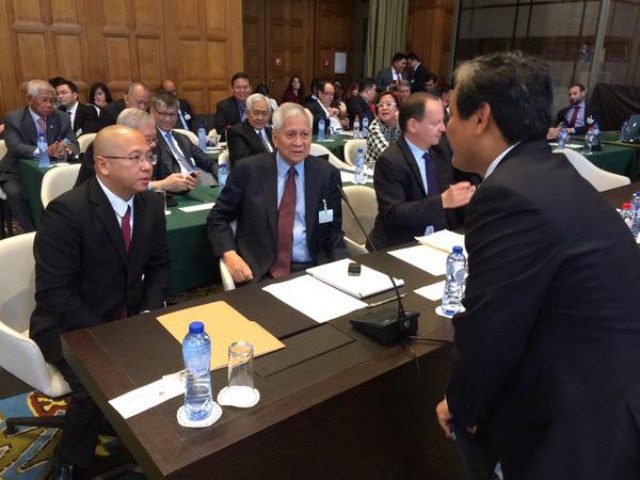SUMMARY
This is AI generated summarization, which may have errors. For context, always refer to the full article.

MANILA, Philippines – The Philippines said China has “irreversibly damaged” the environment as the Southeast Asian country tried to convince an arbitral tribunal at The Hague, Netherlands, that it has the right to hear the Philippines’ case.
On the second day of oral arguments at The Hague, Professor Alan Boyle of the Philippine team “presented to the tribunal arguments regarding the strength of the Philippines’ environmental and fishing claims against China.”
In a bulletin Thursday, July 8, Deputy Presidential Spokesperson Abigail Valte added that the Philippines’ advocates – Lawrence Martin, Bernard Oxman, and Paul Reichler – argued “why the Philippines’ claims fall squarely within the jurisdiction of the tribunal.”
A day earlier, Philippine Foreign Secretary Albert del Rosario also said China’s activities in the West Philippine Sea (South China Sea) damage the environment.
Del Rosario on Tuesday, July 7, cited China’s island building activities in the West Philippine Sea, including areas within the Philippines’ 200-nautical mile exclusive economic zone (EEZ).
Under the United Nations Convention on the Law of the Sea (UNCLOS), only the Philippines has the right to fish within its EEZ.
Del Rosario said that “China has irreversibly damaged the regional marine environment, in breach of UNCLOS, by its destruction of coral reefs in the South China Sea, including areas within the Philippines’ EEZ, by its destructive and hazardous fishing practices, and by its harvesting of endangered species.”
China’s island building adds a new dimension to Manila’s case against Beijing.
It wasn’t part of the Philippines’ arguments when it filed its case against China in January 2013.
The reclamation activities came “immediately after we filed the arbitration case,” Department of Foreign Affairs spokesman Charles Jose said in April.
A powerhouse Philippine team is in The Hague from Tuesday until Monday next week, July 13, for oral hearings in its case against China. The issue at stake is whether the tribunal has the right to hear the Philippines’ case. (READ: Philippines vows to smash China’s strongest argument)
China acting ‘forcefully’
In his speech on Tuesday, Del Rosario also cautioned the tribunal that China’s expansive claim over disputed waters threatens the law of the sea, and endangers small countries like the Philippines. (READ: FULL TEXT: The Philippines’ opening salvo at The Hague)
He then slammed China’s assertion of historic rights through its 9-dash line. (READ: Top Philippine judge uses Chinese maps vs China)
The 9-dash line is China’s demarcation to claim virtually the entire South China Sea.
The Philippines argues that the 9-dash line is illegal under UNCLOS. Instead, what UNCLOS allows is a 200-nautical mile EEZ. (READ: PH vs China at The Hague: ‘80% of fish’ at stake)
Del Rosario said: “In fact, China has done much more, Mr President, than to simply claim these alleged ‘historic rights.’ It has acted forcefully to assert them, by exploiting the living and non-living resources in the areas beyond the UNCLOS limits.”
China, for instance, has buried 311 hectares of coral reefs through its island building activities, according to the Philippines.
At the same time, China has “forcibly” prevented other coastal states, including the Philippines, “from exploiting the resources in the same areas.”
Filipino fishermen, for one, have complained that China is blocking them from fishing in the South China Sea.
Del Rosario said: “Subsequent events, including China’s acceleration of massive land reclamation activities, which it has undertaken – and continues to undertake – in blatant disregard of the Philippines rights’ in its EEZ and continental shelf, and at tremendous cost to the marine environment in violation of UNCLOS – only serve to reconfirm the need for judicial intervention.” – Rappler.com
Add a comment
How does this make you feel?
There are no comments yet. Add your comment to start the conversation.